 |
|
|
| (Information by Peter Kessler, with additional information by Edward Dawson, from The Mongol Empire: Genghis Khan: His Triumph and his Legacy, Peter Brent (Book Club Associates, 1976), from The Mongols: A Very Short Introduction, Morris Rossabi (Oxford University Press, 2012), from International Orders in the Early Modern World: Before the Rise of the West, Yongjin Zhang, Shogo Suzuki, & Joel Quirk, from the New World Encyclopaedia, from Crimean Tatars, H B Paksoy, from The Origins of Northern China's Ethnicities, Zhu Xueyuan (Beijing 2004), from The History of the Medieval World: From the Conversion of Constantine to the First Crusade, Susan Wise Bauer (2010), from Genghis Khan, Paul Ratchnevsky (Thomas Nivison Haining, Trans & Ed, Cambridge, Massachusetts, 1991), and from External Links: Turcology and Linguistics, Éva Ágnes Csató (with editors), text by Peter B Golden, and The Shaping of the Cuman-Qïpchaqs, Peter B Golden, and Origins of the Volga Tatars, and Tatar.net (dead link), and The True Origin of the Mongols?, John Man (Oxford Alumni, 28 July 2020).) |
|
|
| 1223 - 1226 |
Juchi / Jochi |
Son of Great Khan Chingiz Khan. Governed Central Asia. |
| 1226 - 1227 |
Jochi's legitimacy as the eldest son of the 'Great Khan', Chingiz Khan has always been open to question, as he had been born shortly after the return of his mother, Börte, from captivity by the Merkits. It is probably thanks to this (at least in part) that he is overlooked as his father's successor as great khan. 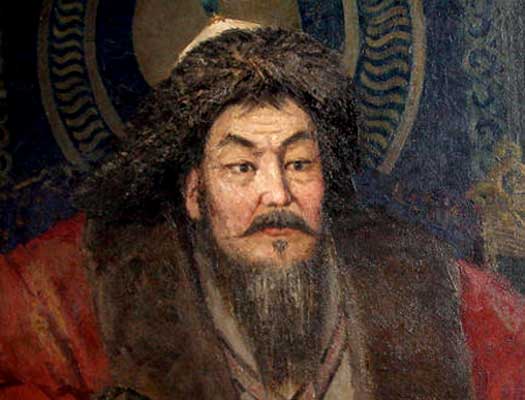 This portrait shown Chingiz Khan in his later years, by which time he had built up an empire which covered much of eastern and Central Asia, as well as stretching into Eastern Europe This portrait shown Chingiz Khan in his later years, by which time he had built up an empire which covered much of eastern and Central Asia, as well as stretching into Eastern Europe |
|
| Jochi dies approximately six months before his father but his family are confirmed as rulers of the Golden Horde by Chingiz Khan himself. Between them, the Blue Horde and White Horde inherit just four thousand of the original Mongol troops and have to recruit heavily from amongst the population of their captured territories, which introduces a very heavy Turkic identity into the horde. |
|
|
| 1226 - 1251 |
Orda Ichen / Orda Khan |
Son. Gained the White Horde as his inheritance. |
| 1227 |
Shiban is too young when his father dies to gain any territories himself, despite being one of Jochi's sub-commanders of the subsidiary White Horde. Instead, his descendants, the Shaibanids (the Grey Horde), carve out their own territory in the fifteenth century in Turkestan when they conquer Transoxiana and Southern Khorasan which is centred around Herat. Orda's elder brother, Batu, commands the Blue Horde. |
|
| 1238 - 1242 |
After devastating the already-subjugated (Mongol) Crimea and subduing Mordovia and Kipchaks on the steppe in 1238, Batu Khan and Subedei turn their attention to Europe in 1239. The Blue Horde Mongols enter Galicia, capturing the capital and destroying the cathedral there. 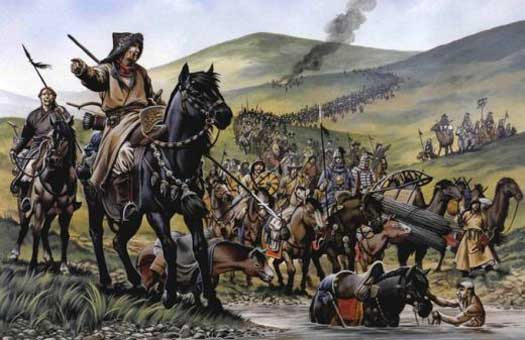 The White Horde ruled the territory between Lake Balkhash and the Volga, while initially continuing to push westwards as part of the greater Golden Horde The White Horde ruled the territory between Lake Balkhash and the Volga, while initially continuing to push westwards as part of the greater Golden Horde |
|
| Both Poland and Hungary are conquered in 1241, while Orda leads the White Horde on an attack against [ Lithuania](../KingListsEurope/EasternLithuania.htm#Kingdom of Lithuania)'s southern borders. However, the death of Ogedei Khan causes the Mongols to withdraw, with Batu Khan intent on securing his conquests in the lands of the Rus. |
|
|
| 1246 |
The election of Guyuk Khan as 'Great Khan' confirms the fears of Batu Khan, so he consolidates his territories to the north of the Caspian Sea and establishes a capital at Sarai Batu (Old Sarai). He converts his territories into a khanate (the equivalent of a kingdom) which becomes known as the Blue Horde. Batu's brothers, Orda and Shiban had also participated in his European campaign, and they now form their own khanates. Orda's khanate, located to the east of the Blue Horde, becomes known as the White Horde, while Shiban's khanate is the relatively obscure Shaibanids. Although both the Blue Horde and White Horde are, in effect independent they still acknowledge the suzerainty of the great khan. 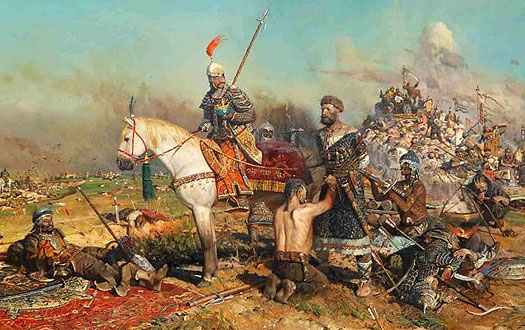 The Battle of the River Kalka in 1221 or 1223 (both dates are reported) was a valiant Rus effort to stem the westwards tide of Mongol advance, but due largely to the refusal of Mstislav 'the Bold' to wait for all of his allied forces to assemble before leaping into battle, it opened the gates to full invasion The Battle of the River Kalka in 1221 or 1223 (both dates are reported) was a valiant Rus effort to stem the westwards tide of Mongol advance, but due largely to the refusal of Mstislav 'the Bold' to wait for all of his allied forces to assemble before leaping into battle, it opened the gates to full invasion |
|
| 1251 - 1280 |
Qun Quran |
Son. No heir. |
| 1256 - 1258 |
Qun Quran sends a contingent of the Golden Horde to assist Hulegu's Il-Khanate against the Abbasids in Mesopotamia. The contingent is commanded by Qun Quran's eldest brother, Kuli, and his death in uncertain circumstances in 1258 while besieging Baghdad causes some ill-feeling between the White Horde and the Il-Khanate. |
|
| 1280 - 1302 |
Kochu / Konchi |
Nephew. Son of Sartaqtay and Qujiyan of the Qongirat tribe. |
| 1294 |
With the death of Kublai Khan, the [Yuan](ChinaDynasties.htm#Yuan Dynasty) dynasty survives under his successor, but the Mongol empire effectively ceases to exist. There are no further khakhans (great khans), and command of the empire's territory is now permanently divided into four distinct and fully independent kingdoms: the Golden Horde (made up of the Blue Horde and White Horde), the Il-Khanate, Mughulistan, and Yuan China. 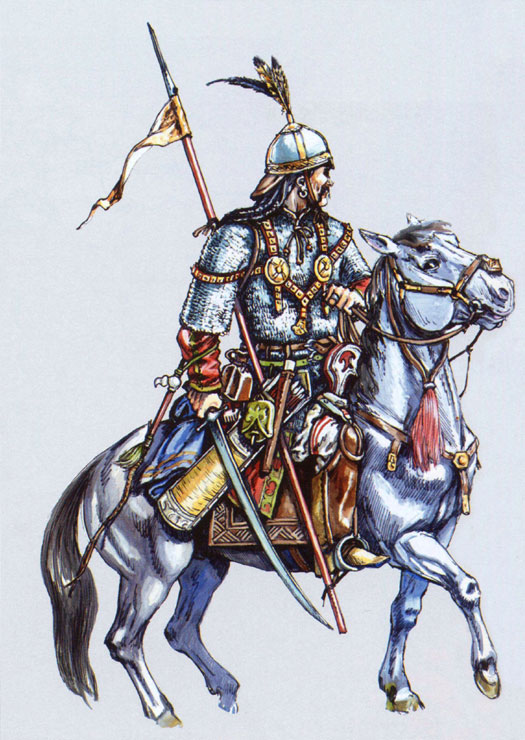 An illustration of a mounted Kipchack warrior, typical of the waves of westward migrants who swept in from the Kazak steppe during the eleventh and twelfth centuries, largely pushed that way by the sudden creation of the Mongol empire An illustration of a mounted Kipchack warrior, typical of the waves of westward migrants who swept in from the Kazak steppe during the eleventh and twelfth centuries, largely pushed that way by the sudden creation of the Mongol empire |
|
| 1302 - 1309 |
Buyan / Bayan |
Cousin? |
| 1302 |
Buyan's accession is far from universally accepted by his own relatives. Led by his cousin, Kobluk, they win support from Du'a of Mughulistan. Buyan fights them on several occasions and seeks help from Toqta of the Blue Horde as the senior khan of the Golden Horde. Toqta warns off the Chaghatayids, and supplies military help. In the end, Buyan is able to defeat his opponents and emerge victorious. |
|
| 1302 - ? |
Kobluk |
Cousin and rival khan. Defeated. |
| 1309 - 1315 |
Sasibuqa (?) |
Son of Buyan. Executed? |
| 1315 |
Details about Sasibuqa's reign as khan are obscure, and some scholars have even doubted his inclusion in the list of khans. It seems that he may resist the Islamicisation policy of Ozbeg Khan of the Blue Horde, and is possibly executed as a result. His successor, whose heritage is unknown, fully supports Ozbeg Khan. 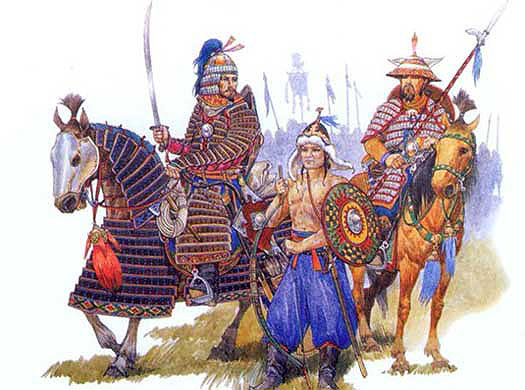 The Mongols maintained their dominance of the eastern Rus with bloodletting where necessary, burning and destroying towns which stood against them The Mongols maintained their dominance of the eastern Rus with bloodletting where necessary, burning and destroying towns which stood against them |
|
| c.1315 - 1320 |
Ilbasan |
Relationship unknown. Supported Islam. |
| 1320 - 1344 |
Mubarak Khwaja |
Brother. Threw off Ozbeg Khan's dominance. Deposed. |
| 1344 |
The act of declaring his independence from the dominance of Ozbeg Khan and his successor, Toni Beg, leads to the downfall of Mubarak Khwaja. Apparently it is Toni Beg who sends a force to dethrone him (before his own downfall in 1342), and install Chimtay in his place. Mubarak's fate is unclear, but he may be allowed to live on in retirement. |
|
| 1344 - 1374 |
Chimtay |
Son of Ilbasan. |
| 1357 - 1359 |
With the assassination of Jani Beg of the Blue Horde, the political cohesion of the Golden Horde begins to disintegrate. Berdi Beg is probably behind Jani Beg's death, and his reign as khan is not universally accepted. The khanate goes from being able to claim titular dominance over the three ulus (Blue Horde, White Horde, and Chaghatayids) and actual dominance over the Rus to internecine warfare and the possibility of complete dissolution. 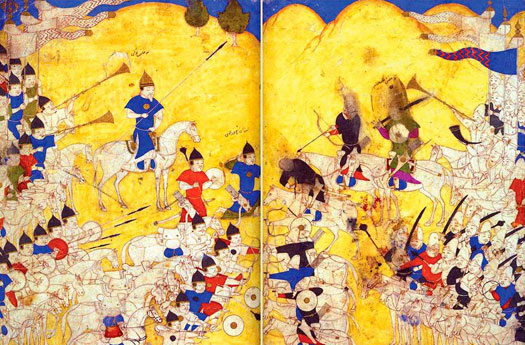 The White Horde found itself freed of dominance by the Golden Horde in the middle of the fourteenth century but political in-fighting destroyed any hope of real power The White Horde found itself freed of dominance by the Golden Horde in the middle of the fourteenth century but political in-fighting destroyed any hope of real power |
|
| 1372 - 1374 |
Urus Khan succeeds in dominating the fragmented Blue Horde for approximately two years, one of its longest periods of near-stability since the murder of Jani Beg. When Urus succeeds to the position of khan of the White Horde in 1374, the Blue Horde continues its internecine fighting once more. Urus is credited as being the direct ancestor of the later khans of Kazan. |
|
| 1374 - 1376 |
Urus |
Son? Former khan of the Blue Horde. |
| 1376 |
Urus defeats Toqtaqiya and expels him from Sabran, but dies soon afterwards. Toqtaqiya returns to claim the throne but he too dies shortly afterwards, perhaps of wounds sustained during his fight against Urus. |
|
| 1376 - 1377 |
Toqtaqiya |
Son. |
| 1377 |
Temur Malik |
Brother. Killed in battle against Toqtamish. |
| 1377 - 1380 |
Toqtamish Khan / Toctamish |
Cousin. Gained Blue Horde to reform Golden Horde. |
| 1378 |
The Blue Horde is heavily defeated by the Muscovites under Demetrius Donski at the Battle of the River Vozha. Two years later the horde is defeated again by the Rus, at the Battle of Kulikovo. 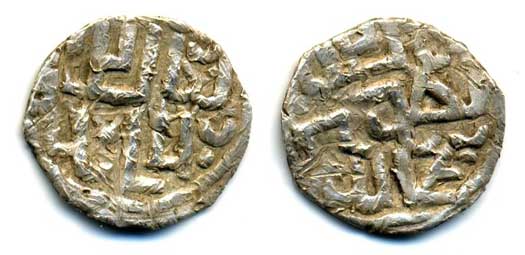 This Russian imitation is of a coin issued (possibly) during the short-lived khanate of Berdi Beg (1357-1359), the victim of an all-too-familiar assassination in the Blue Horde This Russian imitation is of a coin issued (possibly) during the short-lived khanate of Berdi Beg (1357-1359), the victim of an all-too-familiar assassination in the Blue Horde |
|
| They begin putting together a retaliatory force but are defeated by Toqtamish Khan in a battle on the banks of the River Kalka. The horde is fully reunited with the White Horde to form a greater Golden Horde. |
|
|
 |
|
|

 This portrait shown Chingiz Khan in his later years, by which time he had built up an empire which covered much of eastern and Central Asia, as well as stretching into Eastern Europe
This portrait shown Chingiz Khan in his later years, by which time he had built up an empire which covered much of eastern and Central Asia, as well as stretching into Eastern Europe The White Horde ruled the territory between Lake Balkhash and the Volga, while initially continuing to push westwards as part of the greater Golden Horde
The White Horde ruled the territory between Lake Balkhash and the Volga, while initially continuing to push westwards as part of the greater Golden Horde The Battle of the River Kalka in 1221 or 1223 (both dates are reported) was a valiant Rus effort to stem the westwards tide of Mongol advance, but due largely to the refusal of Mstislav 'the Bold' to wait for all of his allied forces to assemble before leaping into battle, it opened the gates to full invasion
The Battle of the River Kalka in 1221 or 1223 (both dates are reported) was a valiant Rus effort to stem the westwards tide of Mongol advance, but due largely to the refusal of Mstislav 'the Bold' to wait for all of his allied forces to assemble before leaping into battle, it opened the gates to full invasion An illustration of a mounted Kipchack warrior, typical of the waves of westward migrants who swept in from the Kazak steppe during the eleventh and twelfth centuries, largely pushed that way by the sudden creation of the Mongol empire
An illustration of a mounted Kipchack warrior, typical of the waves of westward migrants who swept in from the Kazak steppe during the eleventh and twelfth centuries, largely pushed that way by the sudden creation of the Mongol empire The Mongols maintained their dominance of the eastern Rus with bloodletting where necessary, burning and destroying towns which stood against them
The Mongols maintained their dominance of the eastern Rus with bloodletting where necessary, burning and destroying towns which stood against them The White Horde found itself freed of dominance by the Golden Horde in the middle of the fourteenth century but political in-fighting destroyed any hope of real power
The White Horde found itself freed of dominance by the Golden Horde in the middle of the fourteenth century but political in-fighting destroyed any hope of real power This Russian imitation is of a coin issued (possibly) during the short-lived khanate of Berdi Beg (1357-1359), the victim of an all-too-familiar assassination in the Blue Horde
This Russian imitation is of a coin issued (possibly) during the short-lived khanate of Berdi Beg (1357-1359), the victim of an all-too-familiar assassination in the Blue Horde